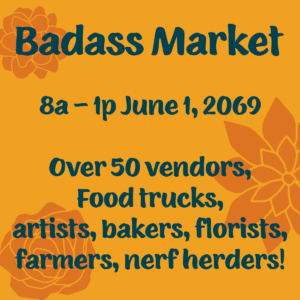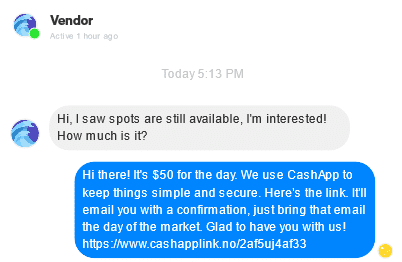By now, we all know someone who has been the victim of a scammer soliciting an event fee for a pop-up market of some kind. When markets restarted after COVID-19 shut them down for up to two years, this type of scam increased dramatically! Now more than ever, we need to learn to avoid getting scammed.
What’s the main problem?
I’m writing about a specific type of scam that is relatively easy for scammers to do. It’s because vendors are constantly looking for new markets to try. Venues are also continually trying to find new ways to serve their communities and earn money. Good markets are a win-win-win for vendors, venues, and communities. Whether large or small, this applies to pop-up markets, regular weekly farmers’ markets, art markets, and even direct sales events.
How does it happen?
The underwhelming concern for fake and scam accounts shown by Facebook forces users to be more vigilant. So how exactly do these types of scams work?
Typically, someone who pretends to be affiliated with a particular market or the venue hosting it will post a comment like the one I created in this made-up market post.

An unsuspecting vendor is interested in the show and messages the scammer, who replies with a payment link. The trick is that the scammer will use a service that doesn’t protect you from scams, like CashApp. I’m not saying you don’t use this service or those legit organizers shouldn’t, but everyone involved needs to understand the risks.
I’m passionate about sharing valuable insights on my website. Your $3 donation will help me cover hosting expenses. Please donate now!👇

The vendor uses the link, an actual link, sends real money, and gets a real email back. Everything looks legit until they show up to the event and aren’t on the vendor list. They show their confirmation email only to hear that the organizer doesn’t use CashApp and that the vendor has been scammed.
What can we do about it?
Thankfully, there are many ways vendors and organizers can avoid this kind of scenario. Don’t send messages to people in the comments if you’re a vendor. You’re probably on the FB event page, which will list the host(s) of the event with links to their business page. Go there and use the “message us” link under their cover image. The wording may have changed, but there should be a button to contact them.
If the post is on a business page, scroll to the top and use the link mentioned above. You also need to make sure that you read the event description and other information posts thoroughly. It’s always a shame to get scammed, but if you’re not reading all the information, you’re not doing your part in avoiding them.
If you’re the person maintaining the FB event post, there are some ways you can mitigate these types of scams. First, put all the information you possibly can in the event description. FB gives you quite a bit of space. Here are some things that most organizers don’t add but should:
- The contact name and email address so vendors can send you questions without relying on FB messenger and verify incoming emails are coming from the legit source.
- The payment details, including what forms are accepted and any pertinent links. The CashApp link, a PayPal link, link to a webform for payment/application.
- Application start/end dates
Yes, the description is intended for some marketing text to draw in your crowds. Still, many vendors are using FB events to find potential upcoming markets for their schedules. I guess what I’m saying is that given the limited tools offered on FB for this kind of thing, make the most of it to keep it as safe as possible. The easiest way to do that is to be upfront with as much information as possible.
Just as importantly and being upfront with information is regularly maintaining your event post(s) so that you can quickly catch these kinds of scammers, delete their comments, and remind people that you have already provided all the legit information.
Vendors should never have to PM or message an organizer to get the basic details of a market. Suppose you’re uncomfortable putting your name and an email address (or website where vendors can find this information, not with a “message us for details”). In that case, event organizing isn’t really for you.
Artists support artists. Your $3 donation will help me cover hosting expenses. Please donate now!👇
Let’s talk more about this. Use the comment form below or head over to the Facebook page.


Leave a Reply